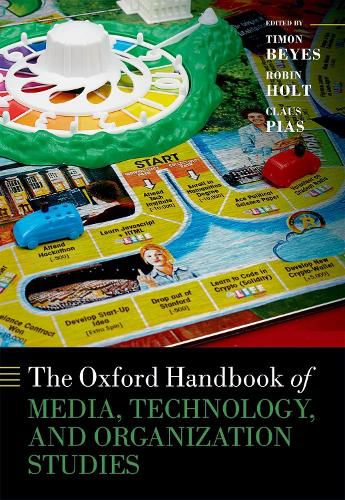Readings Newsletter
Become a Readings Member to make your shopping experience even easier.
Sign in or sign up for free!
You’re not far away from qualifying for FREE standard shipping within Australia
You’ve qualified for FREE standard shipping within Australia
The cart is loading…






Our most basic relationship with the world is one of technological mediation. Nowadays our available tools are digital, and increasingly what counts in economic, social, and cultural life is what can be digitally stored, distributed, replayed, augmented, and switched. Yet the digital remains very much materially configured, and though it now permeates nearly all human life it has not eclipsed all older technologies. This Handbook is grounded in an understanding that our technologically mediated condition is a condition of organization. It maps and theorizes the largely unchartered territory of media, technology, and organization studies. Written by scholars of organization and theorists of media and technology, the chapters focus on specific, and specifically mediating, objects that shape the practices, processes, and effects of organization. It is in this spirit that each chapter focuses on a specific technological object, such as the Battery, Clock, High Heels, Container, or Smartphone, asking the question, how does this object or process organize? In staying with the object the chapters remain committed to the everyday, empirical world, rather than being confined to established disciplinary concerns and theoretical developments. As the first sustained and systematic interrogation of the relation between technologies, media, and organization, this Handbook consolidates, deepens, and further develops the empirics and concepts required to make sense of the material forces of organization.
$9.00 standard shipping within Australia
FREE standard shipping within Australia for orders over $100.00
Express & International shipping calculated at checkout
Our most basic relationship with the world is one of technological mediation. Nowadays our available tools are digital, and increasingly what counts in economic, social, and cultural life is what can be digitally stored, distributed, replayed, augmented, and switched. Yet the digital remains very much materially configured, and though it now permeates nearly all human life it has not eclipsed all older technologies. This Handbook is grounded in an understanding that our technologically mediated condition is a condition of organization. It maps and theorizes the largely unchartered territory of media, technology, and organization studies. Written by scholars of organization and theorists of media and technology, the chapters focus on specific, and specifically mediating, objects that shape the practices, processes, and effects of organization. It is in this spirit that each chapter focuses on a specific technological object, such as the Battery, Clock, High Heels, Container, or Smartphone, asking the question, how does this object or process organize? In staying with the object the chapters remain committed to the everyday, empirical world, rather than being confined to established disciplinary concerns and theoretical developments. As the first sustained and systematic interrogation of the relation between technologies, media, and organization, this Handbook consolidates, deepens, and further develops the empirics and concepts required to make sense of the material forces of organization.